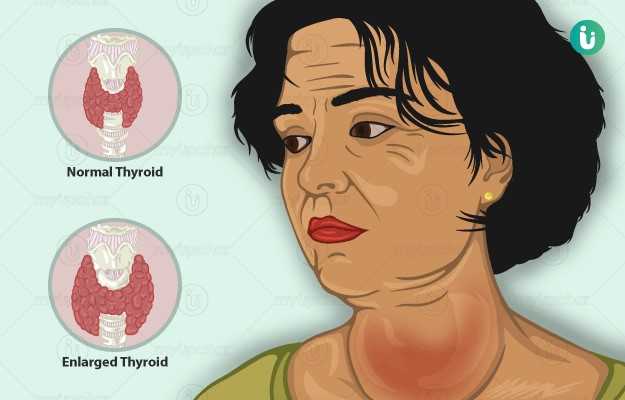What is a goitre?
Goitre, also known as iodine deficiency disorder, is an abnormal enlargement of the thyroid gland. Deficiency of iodine is the leading cause of goitre. Due to the lack of iodine, the thyroid gland is unable to make the hormone thyroxine, which increases the level of thyroid stimulating hormone (TSH), resulting in swelling of the thyroid gland, also called goitre.
Goitre occurs as two variants, namely,
- Diffuse goitre: The entire thyroid gland is enlarged.
- Nodular goitre: Only some sections or nodules of the thyroid gland are enlarged.
What are its main signs and symptoms?
Symptoms of goitre differ, mostly based on the cause of the condition.
- The most common symptom of goitre:
- Swelling at the base of the neck.
- Other symptoms include:
- Tightness in the throat.
- Hoarseness of voice.
- Coughing.
- Trouble swallowing when the enlarged thyroid gland presses on the oesophagus or food pipe.
- Trouble breathing because of the pressure on the windpipe.
- Symptoms associated with hyperthyroidism include:
- Intolerance to heat.
- Weight loss.
- Increased appetite.
- Symptoms associated with hypothyroidism include:
- Weight gain.
- Intolerance to cold.
- Constipation.
- Dryness of the skin.
- Fatigue.
What are the main causes?
One of the most common causes of goitre is the deficiency of iodine.
Iodine deficiency may occur as a result of decreased iodine in the diet, consumption of food items that neutralise iodine, such as cabbage, cauliflower, and broccoli.
- Other causes include:
- Hyperthyroidism - high thyroid hormone levels.
- Hypothyroidism - low levels of the thyroid hormone.
- Graves’ disease - increased thyroid hormone production by thyroid cells.
- Hashimoto’s disease - damaged thyroid gland due to immune system abnormalities.
- Thyroid cancer
- Certain drugs like lithium and phenylbutazone may also lead to goitre.
How is it diagnosed and treated?
A physical examination along with a few investigations aid in the diagnosis of goitre.
Investigations include:
- Blood tests for measuring thyroid hormone levels.
- Blood tests to detect antibodies for Hashimoto’s and Graves’ disease.
- Ultrasound scan.
- Magnetic resonance imaging (MRI) or computed tomography (CT) scan.
- Biopsy.
- Hormone tests to assess thyroid activity.
Treatment of goitre depends on the cause, symptoms and size of goitre.
- A mildly enlarged thyroid gland with normal thyroid hormone levels may be kept under observation.
- Your doctor may prescribe medications for abnormal thyroid activity.
- Iodine supplements may be given for managing iodine levels as necessary.
- Your doctor may recommend radioactive thyroid therapy to be taken orally for an overactive thyroid.
- In the case of cancer or a very large goitre, surgery may be required along with radioactive thyroid treatment.

 Doctors for Goiter
Doctors for Goiter  OTC Medicines for Goiter
OTC Medicines for Goiter



















